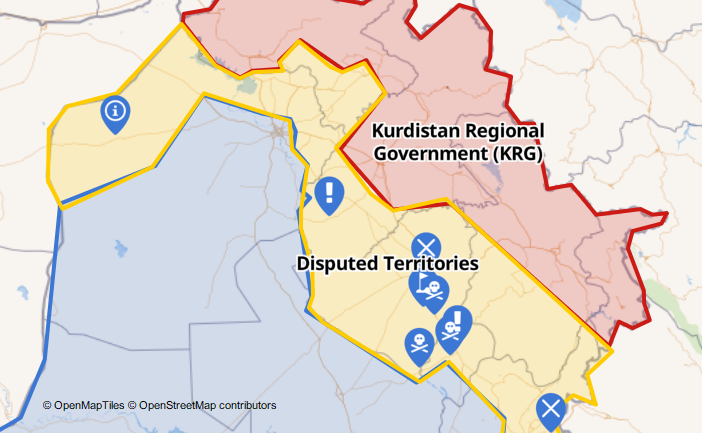1.4K
Kirkuk
- Locals in Kirkuk city protested against continued gas shortages in the province for weeks. On March 19th, angry protestors prevented the General Director of Oil and Gas distribution, Hussien Talib, from speaking as he attempted to engage with protestors. Hussien was sent by Iraq’s Prime Minister Mustafa al Kadhimi to see the province’s issues. Protesters chanted “all of you are thieves” against the government officials. A video on social media went viral as a Turkman protester shouted,” bring back Najmaldin from the grave to improve our situation,” in reference to life under the late governor of Kirkuk, Dr. Najmaldin Karim. Despite visits from officials in Baghdad and Kirkuk administrations’ pledges to fix the issue, gas shortages remain unsolved. Further, the leaders of the Turkish-backed Turkmeneli held a press conference bashing Kirkuk’s administration for failure in resolving the shortages of gas, electricity, water, and other services. Turkmeneli supported the sacking of the Kurdish administration in 2017 in the province.
- ISIS (Da’esh) terrorists have launched more attacks in Kirkuk, including on Sunday, targeting the federal police in the Zeghaiton and Rokhana valleys. As a result, two police officers were severely wounded. Moreover, on March 21st, Da’esh terrorists attacked the Iraqi Army’s 45th division near Albo Mohammed village in the Daquq district. The attack resulted in the death of one Iraqi soldier and the injury of another. Separately, the Iraqi interior ministry is opening a branch of military court in Kirkuk for the first time. According to Kirkuk’s police, the court will operate next month; its main task is to prosecute crimes committed by the security personnel.
- According to the Mine Action Department Director-General, Dhafer Mahmoud Khalaf, 18 million square meters in Kirkuk is contaminated with mines, calling for help from the “International organizations for the return of displaced families to their places.” Despite the physical defeat of the Da’esh Caliphate four years ago, both local and federal governments have failed to clear war remnants and provide primary services to the liberated areas.
Tuz Khurmatu
- Saladin’s Education Department has shut down a Kurdish school under the pretext of not having enough students. The Zari elementary school is located in Hama Garep villages near Daquq, part of Kirkuk province, but the Saladin governorate has administered the village. After the school closure, the education department transferred the school supplies to non-Kurdish schools in Tuz Khurmatu.
- On Saturday, March 19th, Da’esh terrorists attempted to control the police station in Yangija village, killing an officer named Murad Bilal and wounding another. The police said the station was attacked by snipers, and clashes continued until the arrival of support forces.
Khanaqin
- Gas shortages continued in Khanaqin, and locals accused the administration of Diyala of lacking provision to the town. Separately, dozens of Kurdish families in Khanaqin had been rejected renewal of residency cards. The authorities prevented the renewal of their residency cards since they have left the town on October 16, 2017, after military aggression by Baghdad on Kurds.
Makhmour
- Two residents of the Makhmour Refugee camp remain missing after days of their departure without returning. Turkey has bombarded the camp on several occasions in the past, and the camp residents have struggled with security measures by the authorities.
Shingal (Sinjar)
- Tensions remain high between the Iraqi forces and the Shingal Resistance Units (YBS); locals in Khanasur protested a curfew imposed by the Iraqi troops. The curfew remains in place, starting at 10:00 pm to 06:00 am every day. Meanwhile, the Jeanine Hennis-Plasschaert Special Representative of the UN Secretary-General for Iraq met with Iraq’s National Security Adviser, Qassim al Arajay, discussing the situation of Shingal, which is facing severe political, economic, and security issues.

